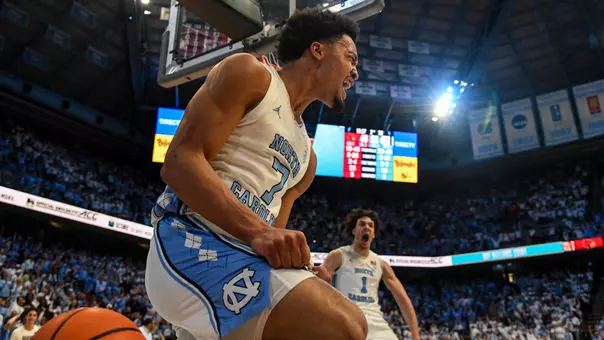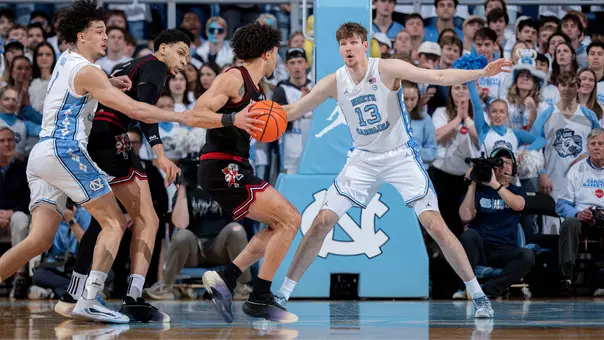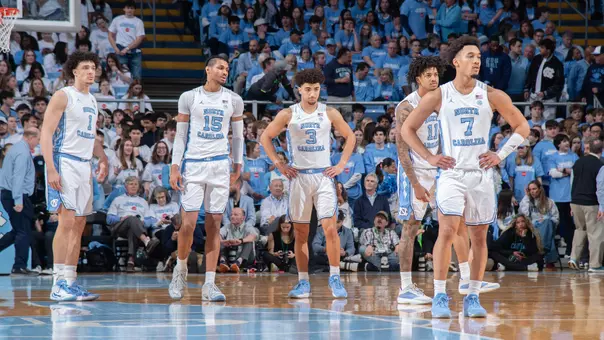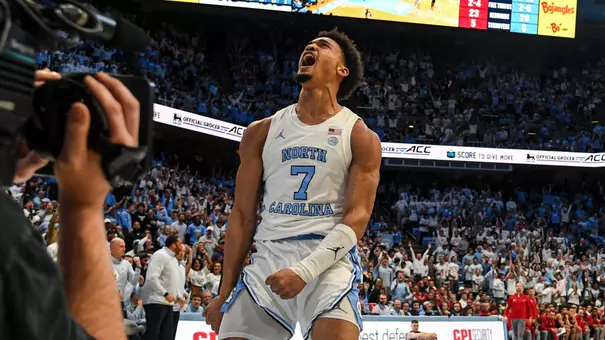University of North Carolina Athletics
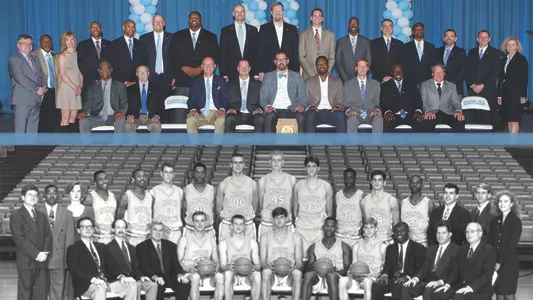
1993 team photos, now and during the NCAA title season.
Tar Heels Celebrate 25 Years Of 1993 NCAA Championship
September 24, 2017 | Men's Basketball
by Steve Kirschner
CHAPEL HILL—"Ain't nothing but a family thing."
I was reminded of that line from an episode of 'The West Wing' during Friday evening's 25th anniversary reunion of Carolina Basketball's 1993 national championship at the Dean E. Smith Center.
All 15 players, six managers, three living members of both the coaching and office staffs, and retired athletics trainer, director of sports medicine and sports information director, gathered with their families and friends for an evening of remembrance of a magical season that just couldn't possibly have taken place a quarter century ago.
Has it really been 25 years since Carolina won its third NCAA championship – and second under head coach Dean Smith in the Crescent City – by beating Michigan, 77-71, in one of the most memorable championship games ever played?
Current UNC head coach Roy Williams had a much-too-close look at that team as his Kansas Jayhawks fell to the Tar Heels in the Superdome in the first semifinal.
"Yeah, I didn't like you guys very much that night," Williams said with a laugh Friday as he addressed the team. "But I had one of the greatest thrills of my life two nights later when I watched the entire replay of the Michigan game with Coach Smith, just the two of us, in his hotel room."
Two o'clock in the morning, most of Tar Heel nation is celebrating on Bourbon and Franklin Streets, and two of the greatest basketball minds ever to run secondary break are sitting in a hotel room watching senior leader George Lynch, All-America center Eric Montross, sharp-shooter Donald Williams and floor general Derrick Phelps lead their school back to the top of the college basketball world.
Players returned to Chapel Hill for the reunion from Germany (co-captain Henrik Rödl), California (where Phelps is an assistant coach at San Francisco and Pat Sullivan is an assistant with the Los Angeles Clippers), Colorado (Matt Wenstrom, like Rödl, one of the heroes of the epic comeback win that year over Florida State), Illinois (where Brian Reese is an assistant at Illinois State), Georgia (Kevin Salvadori), South Carolina (Ed Geth), Tennessee (Randy Wiel), Texas (Lynch) and across the Tar Heel state.
Sullivan, resident Tar Heel legend Phil Ford and Lynch spoke for roughly an hour, regaling their teammates and guests with stories and recollections from that championship season, their Tar Heel careers and invariably, coaches Smith and Guthridge, who both passed away in 2015.
They toured the Smith Center, gushed over the team's new locker room and meeting space, posed for photos and shared stories, then met up again on Saturday to take in the UNC-Duke football game under a Carolina Blue sky.
Several themes are clear after listening to Sullivan, Ford and Lynch, as well as the other players and coaches:
• love for Smith, confidence and unwavering faith in his ability to find an edge to win close games and come back from almost any deficit, and belief in Smith's character and integrity
• respect for and even a little fear, in a funny sort of way, of Guthridge (don't be late and don't embarrass the program or else you dealt with the wrath of Coach Guthridge)
• admiration for Lynch, the unquestioned senior leader, whose stoic resolve powered the team's relentless pursuit of Smith's second national championship
• confidence in their ability to play with any team in the country and fear no one; the one-point loss to Michigan's Fab Five in Hawaii in December only bolstered their belief they were capable of beating anyone
• and never underestimate the value and power of chemistry; they liked each other and genuinely enjoyed hanging out with one another. They wanted to win for Smith, but they also wanted to end Duke's two-year title run and send Lynch, Rödl and the other seniors out with rings of their own.
Ford and Lynch shared different versions of how Ford would often remind the players in practice that his jersey hung in the rafters in the front row, the place reserved for those numbers that are retired, the very best of the best.
Lynch teased Ford that the players got the last laugh by hanging a national championship banner at the other end of the Dome; Ford poignantly said the one loss that haunts him more than any other is the 1977 title game to Marquette, which deprived the maestro of the Four Corners with his own national title banner as a player.
It took one of Carolina's best defensive teams to win in '93. Yes, the Tar Heels averaged 86 points a game in an era with a 45-second shot clock (scoring 100 or more points in 10 of 38 games), dominated the glass, and had an inside-outside scoring balance that is the blueprint of successful Carolina Basketball teams, but it was a lineup of elite defenders that brought home the championship hardware.
It started out front with Phelps, arguably UNC's best-ever defensive point guard, whose wiry arms and quick feet ball-hawked their way to the school record for steals. Rödl and Brian Reese were both long and had good defensive instincts on the wing; Lynch was a shutdown defender and relentless rebounder; and there were not one, nor two, but three seven-footers capable of clogging the lane and swatting away shots in Montross, Salvadori and Wenstrom.
And there was Smith. Twenty-five years after the win over Cincinnati in the Meadowlands, there were Sullivan and others laughing like teenagers at the thought of Smith's improvisation in the Elite Eight game that sent the winner to the Final Four.
Nick Van Exel was draining threes from everywhere but the Jersey Turnpike in the first 10 minutes, scoring 21 points as the Bearcats built a 15-point lead, but Sullivan recounted how Smith told Phelps to forget Carolina's defensive principles, simply guard Van Exel and not let him touch the ball. The result – Phelps chased Van Exel all over the court and Cincy's top scorer had just two points over the final 30 minutes.
Smith also pretty much just drew up from scratch the final play in regulation. If there were dirt on the floor of the Meadowlands, you would have seen Smith's fingerprints as he devised a play to get Reese a basket before the clock expired. Sullivan marveled that Smith said, "We got 'em," as he slapped his leg when he saw what defense the Bearcats were in after a timeout with the game tied and a second to play. And Carolina did have them, but Reese went for the dunk and missed, a hook he thankfully slid off when Williams hit two threes in overtime as UNC surged for the win.
That was the kind of coaching acumen and creativity Carolina came to expect from Smith. Abandon your defensive principles with the Final Four on the line, sure. Draw up a play they hadn't run all year with a second on the clock, hey, why not? Funny thing is, the players just knew it would work and if often did.
And it was defense in the final hectic seconds of the national championship game that forced Michigan All-America Chris Webber to call the timeout the Wolverines didn't have. One of history's unfortunate twists has been the one play many remember is that timeout, and that's a shame.

They forget that for the second straight game, a soft-spoken, sweet-strokin' sophomore from Garner scored 25 points on the game's largest stage; they forget Montross scored 16 points and held the more ballyhooed Juwan Howard to just seven; they forget Lynch's fourth straight double-double; and they forget why Webber was forced to call timeout – Phelps steered Webber to the sideline where he and Lynch locked him a double team and every other Tar Heel defender (Salvadori, Sullivan and Williams) rotated exactly to where they should have on the floor, executing a defensive plan Smith practiced each and every day.
Williams is one of the game's most underappreciated Final Four MVPs, likely because he played two more college seasons and never played in the NBA. He averaged 21 points in UNC's first four games in '93, but went through a three-game stretch in late February in which he scored a total of 17 points. It was actually during that low-scoring stretch in which Smith inserted Williams into the starting lineup, a change Smith stuck with the rest of the season. Well, let's see, how did that move pay off?
Williams exploded for 27 in the regular-season finale win over Duke and went off for 22, 21, 25 and 25 in the last four wins over Arkansas, Cincinnati, Kansas and Michigan. He's one of 12 players in college basketball history to score 25 or more points in both games in the Final Four. Pretty select company in that group – guys named Lew Alcindor, Cazzie Russell, Gail Goodrich, Jerry West and Danny Manning. And you know how many players have accomplished this since Williams did it in 1993? If you guessed none, you win.
And there was The Donald on Friday night, hugging that championship trophy and mugging for photos like we were back in the Superdome 25 years ago, flashing a youthful smile that lit up the New Orleans night in 1993.
When the speeches and stories were over, the champs paused to take one more team photo, being careful to line up in exactly the same order as they did so many years ago. But this time, with an assist from Wenstrom, they left two chairs open. One for Coach Guthridge, the other for Coach Smith.
After all, it was a family photo.
CHAPEL HILL—"Ain't nothing but a family thing."
I was reminded of that line from an episode of 'The West Wing' during Friday evening's 25th anniversary reunion of Carolina Basketball's 1993 national championship at the Dean E. Smith Center.
All 15 players, six managers, three living members of both the coaching and office staffs, and retired athletics trainer, director of sports medicine and sports information director, gathered with their families and friends for an evening of remembrance of a magical season that just couldn't possibly have taken place a quarter century ago.
Has it really been 25 years since Carolina won its third NCAA championship – and second under head coach Dean Smith in the Crescent City – by beating Michigan, 77-71, in one of the most memorable championship games ever played?
Current UNC head coach Roy Williams had a much-too-close look at that team as his Kansas Jayhawks fell to the Tar Heels in the Superdome in the first semifinal.
"Yeah, I didn't like you guys very much that night," Williams said with a laugh Friday as he addressed the team. "But I had one of the greatest thrills of my life two nights later when I watched the entire replay of the Michigan game with Coach Smith, just the two of us, in his hotel room."
Two o'clock in the morning, most of Tar Heel nation is celebrating on Bourbon and Franklin Streets, and two of the greatest basketball minds ever to run secondary break are sitting in a hotel room watching senior leader George Lynch, All-America center Eric Montross, sharp-shooter Donald Williams and floor general Derrick Phelps lead their school back to the top of the college basketball world.
Players returned to Chapel Hill for the reunion from Germany (co-captain Henrik Rödl), California (where Phelps is an assistant coach at San Francisco and Pat Sullivan is an assistant with the Los Angeles Clippers), Colorado (Matt Wenstrom, like Rödl, one of the heroes of the epic comeback win that year over Florida State), Illinois (where Brian Reese is an assistant at Illinois State), Georgia (Kevin Salvadori), South Carolina (Ed Geth), Tennessee (Randy Wiel), Texas (Lynch) and across the Tar Heel state.
Sullivan, resident Tar Heel legend Phil Ford and Lynch spoke for roughly an hour, regaling their teammates and guests with stories and recollections from that championship season, their Tar Heel careers and invariably, coaches Smith and Guthridge, who both passed away in 2015.
They toured the Smith Center, gushed over the team's new locker room and meeting space, posed for photos and shared stories, then met up again on Saturday to take in the UNC-Duke football game under a Carolina Blue sky.
Several themes are clear after listening to Sullivan, Ford and Lynch, as well as the other players and coaches:
• love for Smith, confidence and unwavering faith in his ability to find an edge to win close games and come back from almost any deficit, and belief in Smith's character and integrity
• respect for and even a little fear, in a funny sort of way, of Guthridge (don't be late and don't embarrass the program or else you dealt with the wrath of Coach Guthridge)
• admiration for Lynch, the unquestioned senior leader, whose stoic resolve powered the team's relentless pursuit of Smith's second national championship
• confidence in their ability to play with any team in the country and fear no one; the one-point loss to Michigan's Fab Five in Hawaii in December only bolstered their belief they were capable of beating anyone
• and never underestimate the value and power of chemistry; they liked each other and genuinely enjoyed hanging out with one another. They wanted to win for Smith, but they also wanted to end Duke's two-year title run and send Lynch, Rödl and the other seniors out with rings of their own.
Ford and Lynch shared different versions of how Ford would often remind the players in practice that his jersey hung in the rafters in the front row, the place reserved for those numbers that are retired, the very best of the best.
Lynch teased Ford that the players got the last laugh by hanging a national championship banner at the other end of the Dome; Ford poignantly said the one loss that haunts him more than any other is the 1977 title game to Marquette, which deprived the maestro of the Four Corners with his own national title banner as a player.
It took one of Carolina's best defensive teams to win in '93. Yes, the Tar Heels averaged 86 points a game in an era with a 45-second shot clock (scoring 100 or more points in 10 of 38 games), dominated the glass, and had an inside-outside scoring balance that is the blueprint of successful Carolina Basketball teams, but it was a lineup of elite defenders that brought home the championship hardware.
It started out front with Phelps, arguably UNC's best-ever defensive point guard, whose wiry arms and quick feet ball-hawked their way to the school record for steals. Rödl and Brian Reese were both long and had good defensive instincts on the wing; Lynch was a shutdown defender and relentless rebounder; and there were not one, nor two, but three seven-footers capable of clogging the lane and swatting away shots in Montross, Salvadori and Wenstrom.
And there was Smith. Twenty-five years after the win over Cincinnati in the Meadowlands, there were Sullivan and others laughing like teenagers at the thought of Smith's improvisation in the Elite Eight game that sent the winner to the Final Four.
Nick Van Exel was draining threes from everywhere but the Jersey Turnpike in the first 10 minutes, scoring 21 points as the Bearcats built a 15-point lead, but Sullivan recounted how Smith told Phelps to forget Carolina's defensive principles, simply guard Van Exel and not let him touch the ball. The result – Phelps chased Van Exel all over the court and Cincy's top scorer had just two points over the final 30 minutes.
Smith also pretty much just drew up from scratch the final play in regulation. If there were dirt on the floor of the Meadowlands, you would have seen Smith's fingerprints as he devised a play to get Reese a basket before the clock expired. Sullivan marveled that Smith said, "We got 'em," as he slapped his leg when he saw what defense the Bearcats were in after a timeout with the game tied and a second to play. And Carolina did have them, but Reese went for the dunk and missed, a hook he thankfully slid off when Williams hit two threes in overtime as UNC surged for the win.
That was the kind of coaching acumen and creativity Carolina came to expect from Smith. Abandon your defensive principles with the Final Four on the line, sure. Draw up a play they hadn't run all year with a second on the clock, hey, why not? Funny thing is, the players just knew it would work and if often did.
And it was defense in the final hectic seconds of the national championship game that forced Michigan All-America Chris Webber to call the timeout the Wolverines didn't have. One of history's unfortunate twists has been the one play many remember is that timeout, and that's a shame.

They forget that for the second straight game, a soft-spoken, sweet-strokin' sophomore from Garner scored 25 points on the game's largest stage; they forget Montross scored 16 points and held the more ballyhooed Juwan Howard to just seven; they forget Lynch's fourth straight double-double; and they forget why Webber was forced to call timeout – Phelps steered Webber to the sideline where he and Lynch locked him a double team and every other Tar Heel defender (Salvadori, Sullivan and Williams) rotated exactly to where they should have on the floor, executing a defensive plan Smith practiced each and every day.
Williams is one of the game's most underappreciated Final Four MVPs, likely because he played two more college seasons and never played in the NBA. He averaged 21 points in UNC's first four games in '93, but went through a three-game stretch in late February in which he scored a total of 17 points. It was actually during that low-scoring stretch in which Smith inserted Williams into the starting lineup, a change Smith stuck with the rest of the season. Well, let's see, how did that move pay off?
Williams exploded for 27 in the regular-season finale win over Duke and went off for 22, 21, 25 and 25 in the last four wins over Arkansas, Cincinnati, Kansas and Michigan. He's one of 12 players in college basketball history to score 25 or more points in both games in the Final Four. Pretty select company in that group – guys named Lew Alcindor, Cazzie Russell, Gail Goodrich, Jerry West and Danny Manning. And you know how many players have accomplished this since Williams did it in 1993? If you guessed none, you win.
And there was The Donald on Friday night, hugging that championship trophy and mugging for photos like we were back in the Superdome 25 years ago, flashing a youthful smile that lit up the New Orleans night in 1993.
When the speeches and stories were over, the champs paused to take one more team photo, being careful to line up in exactly the same order as they did so many years ago. But this time, with an assist from Wenstrom, they left two chairs open. One for Coach Guthridge, the other for Coach Smith.
After all, it was a family photo.
UNC Baseball: Paulsen Homers Twice in 13-3 Win vs VCU
Thursday, February 26
THE ARENA DISCUSSION - Episode 1: Lee Roberts & Bubba Cunningham
Wednesday, February 25
UNC Baseball: Hull, Schaffner Lift Tar Heels Over NC A&T, 9-1
Tuesday, February 24
Chloe Humphrey Receives 2025 Honda Award - February 23, 2026
Tuesday, February 24










